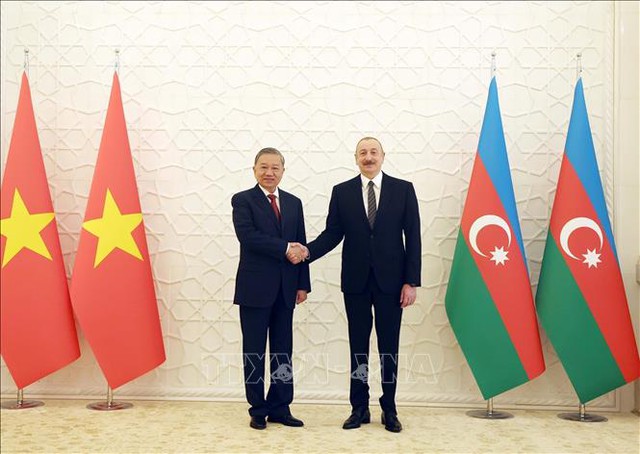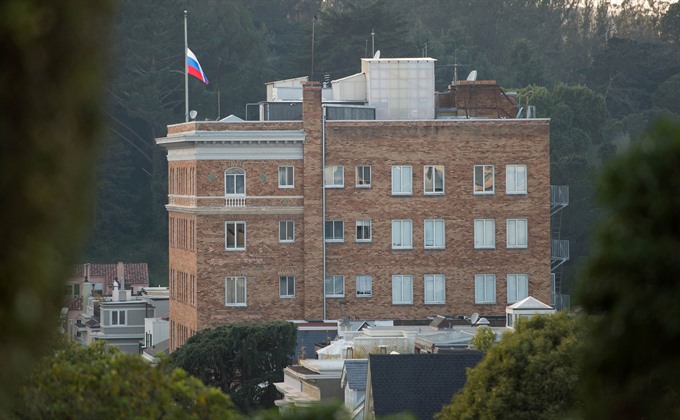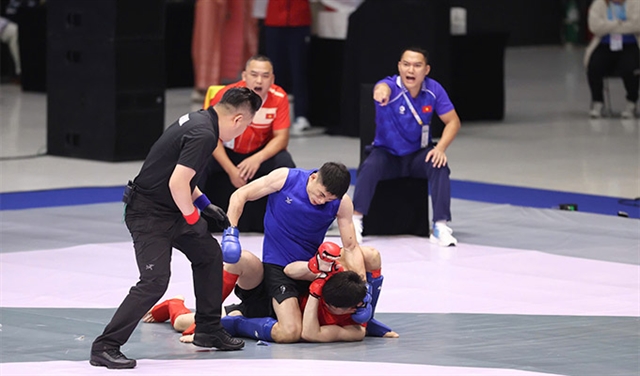 World
World

President Barack Obama yesterday unleashed a barrage of retaliatory measures against Moscow for meddling in the US election, imposing sanctions on two intelligence agencies, expelling 35 agents and shuttering two Russian compounds inside the United States.
 |
| The Russian flag flies at half mast at the Consulate-General of Russia in San Francisco, California on December 29. President Barack Obama unleashed a barrage of retaliatory measures against Moscow for "meddling in the US election", imposing sanctions on two intelligence agencies, expelling 35 agents and shuttering two Russian compounds inside the United States in New York and Maryland. AFP/VNA Photo |
WASHINGTON — President Barack Obama on Thursday unleashed a barrage of retaliatory measures against Moscow for meddling in the US election, imposing sanctions on two intelligence agencies, expelling 35 agents and shuttering two Russian compounds inside the United States.
Making good on a promise to punish Vladimir Putin’s government for allegedly trying to tilt the 2016 election in Donald Trump’s favour, Obama unveiled a broad range of steps that will inflame tensions with both Moscow and the president-elect.
US intelligence had concluded that a hack-and-release of Democratic Party and Hillary Clinton staff emails was ordered by the Kremlin and was designed to put the Republican real estate mogul in the Oval Office.
"I have ordered a number of actions in response to the Russian government’s aggressive harassment of US officials and cyber operations aimed at the US election," Obama said in a statement.
Trump said that while he believes the US should "move on to bigger and better things," he would meet with intelligence leaders next week for a briefing on the situation.
In response to the hacks -- dubbed "Grizzly Steppe" by US officials -- Obama announced sanctions against Russia’s military intelligence agency, known as GRU, and the FSB -- the KGB’s successor.
The 35 Russian intelligence operatives -- based at the Russian embassy in Washington and the consulate in San Francisco -- have been declared "persona non grata" and ordered to leave the country within 72 hours.
US officials also moved to close two Russian compounds in New York and Maryland.
The latter facility, a summer house a short drive from the US capital, was once featured in a Washington lifestyle magazine and was described as a stately home surrounded by lush gardens on the banks of the Chester River, with an "impressive collection of German and Hungarian porcelains."
The US government said it is now used "for intelligence-related purposes." Obama warned of further covert actions.
"These actions follow repeated private and public warnings that we have issued to the Russian government, and are a necessary and appropriate response to efforts to harm US interests in violation of established international norms of behavior," he said.
Those warnings, officials said, included a personal message from Obama to Putin when the two leaders met briefly in Hangzhou, China in September.
Russian reprisals?
Moscow quickly rejected US accusations of cyber-interference as "unfounded," and vowed to retaliate.
Kremlin spokesman Dmitry Peskov accused the Obama administration of trying to "definitively destroy US-Russia relations which have already reached a low."
He said Moscow would "react in an adequate manner based on the principles of reciprocity."
US officials said they were aware of reports that Moscow may have ordered the closure of the Anglo-American School in the Russian capital -- attended by many children of diplomats -- but they could not confirm those reports.
Trump has questioned whether Russia really tipped the electoral scale, painting Obama’s accusations as a thinly veiled effort by a Democratic president to delegitimise a Republican victory.
While Trump has already received intelligence briefings about the election and substantial evidence is in the public sphere, his pledge to meet with intelligence chiefs could provide a face-saving opportunity to further soften his stance.
Could Trump change course?
The timing of Obama’s actions leave Trump and Moscow in a difficult position.
Any attempt by the mogul-turned-politico to reverse Obama’s sanctions once he takes office on January 20 would be widely seen as condoning Russian interference.
Trump’s fellow Republicans are also limiting his room for maneuver, increasingly distancing themselves from his pro-Russian stance.
House Speaker Paul Ryan issued a statement welcoming the sanctions as "overdue."
"Russia does not share America’s interests. In fact, it has consistently sought to undermine them," he said.
Senior lawmakers on both sides of the political aisle have called for a congressional probe into Russia’s actions. Obama said Congress would receive a report in the coming days about Russia’s cyber-meddling. — AFP





 Brandinfo
Brandinfo